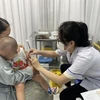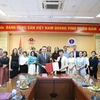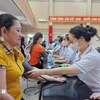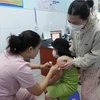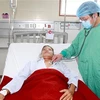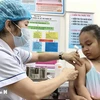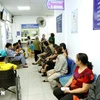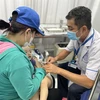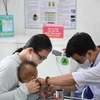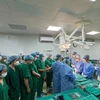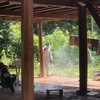Head representative of the World Health Organisation (WHO) in Vietnam Takeshi Kasai has urged the country to enhance inter-sectoral coordination, especially between medical and veterinary sectors in the fight against animal-to-human epidemics.
While working in the southern province of Dong Nai on May 9, Kasai vowed that his organisation will distribute the antiviral drug Tamiflu to Vietnamese cities and provinces whenever an epidemic occurs.
Cao Trong Nguong, Director of the provincial Preventive Medicine Centre, said the province has recorded over 5,600 cases of A/H1N1 influenza since 2009, including two fatalities. Meanwhile, no cases of A/H5N1 or the new strain A/H7N9 have been detected since 2004.
However, Nguong warned that the risk of an outbreak is high as the locality is a gateway into Ho Chi Minh City, and home to the country’s largest flock of poultry. A massive number of foreigners also come in and out of the province everyday.
In the past, the provincial Veterinary Department took 74 samples of salangane birds raised at farms in the province, which later tested negative for A/H5N1 virus. However, the selling and killing of poultry with ambiguous origin risk an outbreak.
In the time to come, a Steering Board on epidemic prevention will be established with the participation of both medical and veterinary sectors. In case of any outbreak in animals or humans, mobile response teams will be set up. More training courses and equipment for medical facilities as well as public awareness campaigns on the pandemic will also get underway.
The avian influenza A/H7N9 virus originally emerged in China and has resulted in many deaths. According to the WHO, elderly people with chronic diseases have the highest risk of contracting the virus. Its symptoms are similar to A/H5N1 bird flu.-VNA
While working in the southern province of Dong Nai on May 9, Kasai vowed that his organisation will distribute the antiviral drug Tamiflu to Vietnamese cities and provinces whenever an epidemic occurs.
Cao Trong Nguong, Director of the provincial Preventive Medicine Centre, said the province has recorded over 5,600 cases of A/H1N1 influenza since 2009, including two fatalities. Meanwhile, no cases of A/H5N1 or the new strain A/H7N9 have been detected since 2004.
However, Nguong warned that the risk of an outbreak is high as the locality is a gateway into Ho Chi Minh City, and home to the country’s largest flock of poultry. A massive number of foreigners also come in and out of the province everyday.
In the past, the provincial Veterinary Department took 74 samples of salangane birds raised at farms in the province, which later tested negative for A/H5N1 virus. However, the selling and killing of poultry with ambiguous origin risk an outbreak.
In the time to come, a Steering Board on epidemic prevention will be established with the participation of both medical and veterinary sectors. In case of any outbreak in animals or humans, mobile response teams will be set up. More training courses and equipment for medical facilities as well as public awareness campaigns on the pandemic will also get underway.
The avian influenza A/H7N9 virus originally emerged in China and has resulted in many deaths. According to the WHO, elderly people with chronic diseases have the highest risk of contracting the virus. Its symptoms are similar to A/H5N1 bird flu.-VNA

